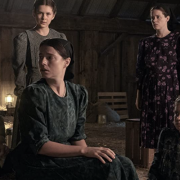Of Elisabeth Elliot, Beth Allison Barr, Kristin Du Mez and Karen Swallow Prior and who gets a seat at the table
This article originally appeared at Baptist News Global on February 16, 2024.
It seems no matter what table a Christian chooses to sit at these days, powerful men are determining who gets a seat, when they can talk and what stories they’re allowed to tell.
This marginalization of voices on the underside of sacralized machismo is evident in three stories from this past week.
These controversies involve Elizabeth Elliot, Beth Allison Barr, Kristin Du Mez and Karen Swallow Prior. And they all relate to the reach of patriarchy’s table and how we should respond — what we should say and shouldn’t say.
Let’s start with the late Elisabeth Elliot. She first came to public attention after her first husband, Jim, was murdered by Amazonian warriors from the Waodani tribe of Ecuador in 1956. He and his fellow missionaries had attempted to share the story of Jesus with the tribe.
Elisabeth Elliot spent two years as a missionary to the tribe that killed her husband. After returning to the United States, she spent five decades publishing 48 books, speaking internationally and hosting a daily radio show, which made her the icon of purity culture and the ueen of complementarianism in conservative evangelicalism.
Elliot’s evolution
The uproar this past week began with an essay by Liz Charlotte Grant that focused on the trajectory of Elliot’s life as revealed in two biographies published in 2023 — Lucy R.S. Austen’s Elisabeth Elliot: A Life and Ellen Vaughn’s Being Elisabeth Elliot.
 Despite where she ended up, Elliot began her career speaking her own mind. She taught both men and women and criticized Christian publishing for “making stories ‘neat and tidy.’” Grant observed, “This Elliot courted the ideas of feminism and gained a reputation as being argumentative and opinionated.”
Despite where she ended up, Elliot began her career speaking her own mind. She taught both men and women and criticized Christian publishing for “making stories ‘neat and tidy.’” Grant observed, “This Elliot courted the ideas of feminism and gained a reputation as being argumentative and opinionated.”
Elliot married three times in her life, with each marriage seeming to become increasingly more dysfunctional over time. Her first marriage to Jim served as the inspiration for her writing. Her second husband, Presbyterian seminary professor Addison Leitch, was described as traditional and institutionalist. He once wrote, “The conversation around women’s liberation is ‘stupid.’” During their marriage, Elliot became more institutional herself and began teaching women to have “unconditional obedience” to their husbands.
Her third marriage is the focus of the current controversy. According to Grant, Elliot’s husband Lars Green “decided when she drank a cup of tea, took a bath, and when she slept. He frequently checked her car’s odometer, double-checking that she hadn’t made any unplanned stops. He controlled the house thermostat. He listened in on her phone conversations and had the final say on whether she visited her friends, often declining invitations for her at the last minute.”
He also kept her away from her children and grandchildren. And he forced her to maintain a rigid speaking schedule, which culminated in her sitting on stage and smiling during her battle with Alzheimer’s while recordings of her teaching played.
Silencing the ‘slander’
Much of the debate among complementarians started when Aimee Byrd quoted Grant on X, saying: “White American evangelicalism needed a symbol, a meek female voice seated at the patriarch’s table — and Elliot complied.”










Leave a Reply
Want to join the discussion?Feel free to contribute!